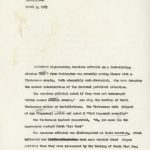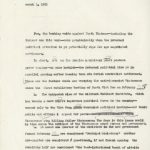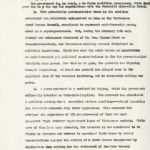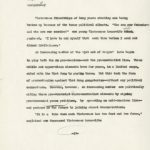1965, March 3, “Fact-Finding Mission from Washington”
DEEPE
ANALYSIS–1
MARCH 3, 1965
SAIGON–A high-ranking American official on a fact-finding mission fron W from Washington was recently eating dinner with a Vietnamese couple, both staunchily anti-Communist, who were decrying the marked deterioration of the internal political situation.
The American official asked if they were not encouraged “after recent evetsk events,” meaning the bombing of North Vietnamese milita ry installations. The Vietnamese wife chipped at her [Stripping?] fingernail polish and asked x “What happened recently?”
The Vietnamese husband responded, “Oh, you mean yhe the aggression against North Viet Nam?”
The American official was flabbergasted at their reaction, which indicated how little effect the much more worried [they were?] about Saigon politics than they were re-assured by the bombing of North Viet Nam.
(More)
deepe
analysis–2
march 3, 1965
For, the bombing raids against North Vietnam–including the largest one this week–came paradoxically when the internal political situation is pt potentially ripe for aye negotiated settlement.
In short, a s as the America n military posit posture grows tougher–or more hawkish–the internal political line is in parallel growing softer leaning towa-rds dovish neutralist settlement. [These are the factors which are worrying the anti-Communist Vietnamese since the first retaliatory bombing of North Viet Nam on February _____7:
1. The unimpeded rise of the militant Buddhist Institute, which has become a most imirt important political force int he country–second only to the Viet Cong guerr Communist political machine–and their public and officia l appeal for peace–but a peace in which“And for Vietnamese to stop killing fellow Vietnamese.” The fear is this [?] issue could in time cause the collapse of the Vietnamese armed forces and government.
2. At least one quarter of the ministers in the new government formed February ___16 are considered “Buddhist ministers;” another one-quarter are considered F pro-French, if not f rench agents; the remaining half are considered “the best-intended bunch of nitwits ever to fill a Cain Cabinet.”–they are considered weak personalities who would easily bend under prevailing political pressure from pro-neutralist factions. No element isappears prepared to resist the Buddhists [or politicians with pro-Buddhist ?]
deepe
analysis–3
march 3, 1965
The government is, in short, a de facto coalition government, which could pave the wa y the way for negotiations with the Communist Liberation Front.
3. This potentially pro-neutralist trend in the civilian government was relatively unimportant as long as the Vietnamese Armed Forces Council, considered to represent anti-Communist power, acted as a super-government. But, during the February 19th coup attempt and subsequent dismissal of Lt. Gen. Nguyen Khanh as Commander-in-Chief, the Vietnamese military council diminished in political importance. Khanh has used the armed forces as a politicamm an anti-Communist p9l political counter-balance to the pro-neutralist Buddhist seas power. Now that he is gone, the generals are fighting amongst themselves; at least one general has slipped over to the political side of the Buddhist Institute, and is indirectly calling for peace.
4. A peace movement ha s surfaced in Saigon, which the government officially labelled as Communist-inspired. The movement has circulated a petition calling for a ceasefire without condition–without demanding the Communist elements stop their aggression. This movement has obtained the signatures of 471 persons–many of them the most respected “high Society” upper-crust layer of Vietnamese society. While some of them have been arrested, the movement is now considered to be wiping up students and workers to spearhead their cause by street demonstrations against the arrival of South Korean troops–and by implication the calling for the withdrawal of American troops.
(More)
deepe
analysis–4
march 3, 1965
4 . The anti-Communist former ba fabricPillars of the Vietnamese society and government are in disarray. The Catholics, the most usually anti-Communist in viewpoint, are dif divided among themselves and are discredited since the February 19th coup attempt. The Americans in officials in Saigon are generally c discredited by both the left-wings faction who hold the UnitedtStatesthem responsible for the February 19th coup attempt, and by the right-wing faction who feel United States policymakers have made a general mess of things the political situation, hence e jeopardizing the anti-Communist war effort. The most important operative element–the armed forces–are suffering from high desertion rates; the fear is that a “push for peace” might cause its collapse. For the first time, officers of as low a rank as captain are attempting to send their families to France.
(More)
deepe
analysis–5
march 3, 1965
Hence, there are two distinct trends–militarly militarily American policymakers are both escalating the war–both in by bombing North Vietnam and southern Laos, and internally by the use of American jets to pound Viet Cong guerrilla strongholds–and are internationalizing the war by the introduction of South Korean troops.
But a second trend is for anti-Comm fewer and fewer anti-Communists to do less and less about the Communist political subversion–which is now considered to be atheir major x course of reaction to the military offensive.
These two trends are considered contradictory–if Washington policymakers intend to prosecute the total war for victory. But the two trends are considered to be in parallel if Washington intends to negotiate–the tough military stance would be considered enough to give American an apparent military victory, but the Communists would be admitted into a coalition government–which would be the prelude to neutralization and years later to a communist takeover.
(More)
deepe
analysis–6
march 3, 1965
“It is a principle in this kind of that the hotter the military war, the more the Communists will push thepolitical subversives,” said one counter-guerrilla expert.
Most foreign diplomats here consider the bombing of North Viet Nam at best a half-solution to the total problems of Viet Nam. A few consider the bombing raids have only created a second problem.
However, tThe pessimists among foreign diplomats and observers here consider the anti-Communist war lost. The optimists believe the trends can still be reversed.–with a great deal of luck.
The pessimm question among the pessimists is whether American troops will be graciously invited to withdraw–or will be “chugged out”. Their fear is the Communists in the provinces–and the Buddhists in Saigon and the major cities–will begin street demonstrations demanding peace–at any pice price. They argue bombing of North Vietnam is now incidental; American policymakers, if they intend to hold in South Viet Nam, x must decide to send in American combat troops.
(More)
deepe
analysis–7
The fear amongst the anti-Communist Vietnamese is the emotional appeal of the Buddhist leaders, who are considered working on behalf of the Communists. The Buddhist political-priests have ignited the issue that being argued in the home of each Vietnamese–including the generals and colonels.
The peace movement–launched by both the Communist subversives and the Buddhist political-priests–is co considered “dynamite” as one Vietnamese businessman explained as is the most discussed development in Saigon. Vietnamese families refuse to hold piastre currency; the price of gold has risen up to 30-40 per cent dyruogduring the past three weeks “and it is being buried in the ground outside Saigon“, according to one businessman. “The Vietnamese hope to get it out in the confusion before the Communists take over.” Other housewives have begun stockgiving rice; the price has risen sharply, although it normally drops following the Chinese New year.
deepe
analysis–89
Vietnamese friendships of long years standing are being broken up because of the tense political climate. “Who are our friends–and who are our enemies?” one young Vietnamese housewife sobed. pondered. “I have to ask myself that each time before I send out dinner invitations.”
An increasing number of the “jet set of Saigon have begun to play both the ro pro-American–and the pro-neutralist line. These middle and upper-class elements have for years, in a limited scope, sided with the Viet Cong by paying taxes. But this took the form of protectionism against Viet Cong gansterism–without any political connections. Nowever, Now, however, an increasing number are politically aiding those pro-Communist orpro-neutralist elements by signing pro-Communist peace petitions, by spreading an anti-American line–and perhaps in the future[later?] by joining street demonstrations.
“It is a time when each Vietnamese has two feet and two faces,” explained one depressed Vietnamese housewife.
-30-
Read Previous Article: 1965, February 18, “Distinct Military Wars”
Read Next Article: 1965, April 7, “Vietnamese Nationalism”








